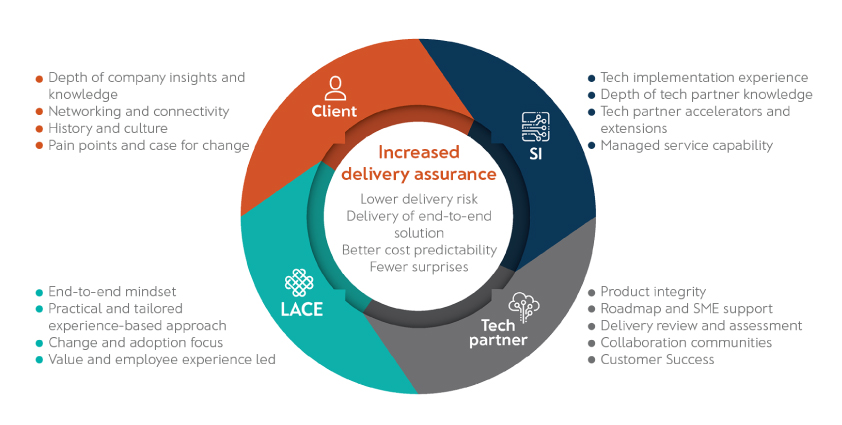In July we launched the first in our series of whitepapers looking at how you can reduce the stress from your HRIS implementation programme going wrong, costing you time, money and effort, resulting in a system that your people don’t use / won’t use / can’t use. At LACE we say we’re ‘fundamentally different’ because we’re technology agnostic, so the paper itself focuses on some universal steps (five in total) you can take to prepare yourself for a new tech launch.
We’re often asked why it’s important that a technology project needs multiple players and not just the buyer (you), with the supplier (the technology provider). In the whitepaper we talk about the ‘stronger together’ dream team of you, the technology partner, a strategic advisory partner (like LACE – other partners are available – but of course we’d love it if you talk to us), as well as a system implementation (SI) partner. The below graphic provides an overview from the whitepaper.
This relationship is fundamental to ensure programme success and being clear on the value, roles and responsibilities up front is critical. But this relationship doesn’t finish when the technology has been selected and is implemented within your business. Making the most of your system is an ongoing task; you have system upgrades, etc, to think of. The level of involvement may flex, but these three parties all need to be involved in the implementation and ongoing optimisation of your system. So we’ve listed below each of the stakeholders, as well as why you need them to ensure your ‘dream team’ continues to deliver.
You (the client)
The typical responsibilities you will focus on for your part would include:
- Bringing in-depth business knowledge, culture, and strategic vision – you know your business better than anyone and you need to be able to ensure you articulate this to all parties.
- Leading in defining project direction and ensuring organisational relevance – you are the customer, you need to make sure what you get is exactly what you asked for when you first established your value case for the new system.
- Taking ownership of testing and IT integration, leveraging internal expertise – This is key for getting all employees to use the system – you will be too, so it has to work for you as well as everyone in your business.
The benefits here will be that you receive comprehensive support from a team with diverse skills and expertise, ensuring alignment with strategic objectives and cultural identity.
System implementation partners (SI)
The typical responsibilities for the SI would be:
- Focusing on the technical configuration, design, build, and implementation of the HRIS – They utilise deep product experience to design a solution fit for your needs.
- Prioritising the successful technical delivery of the system – They are experienced in taking the mandated product methodologies and adapt it so that it meets your requirements, timelines and budgets.
For the SI the benefit of this relationship is that they get clear requirements from you, efficient communication from all parties, as well as troubleshooting support from parties who have experience in working on these projects (the technology provider or the advisory partner).
The technology partner
The role of the technology provider is to:
- Offer product expertise and support to ensure proper implementation – They know their product better than anyone and if they have won your business, they will want to give you that support so you make use of all of its benefits.
- Contribute to producing the programme assets, quality checks, and technical resources – You aren’t the technical experts, they are, so they need to ensure that their system does everything that they’ve promised it will – it’s in their interest as much as yours.
- Act as an advocate for their technology’s successful adoption – If your story is a successful one, it means that you can build a long-lasting relationship, maintain use of your software and even have you act as an advocate (if it is working perfectly).
The strategic advisory partner (Somebody like LACE)
When we’re working in a four-party relationship like this, our roles and responsibilities are to:
- Act as a bridge between the you, SI, and vendor, facilitating communication and collaboration – we keep everything running smoothly, help to quickly react to challenges or issues, become your voice to all parties (because let’s face it, you have a day job to focus on!) and make sure that all parties get the outcome they desire.
- Provide strategic guidance and expertise throughout the entire HR transformation journey – We’ve run hundreds of projects just like yours, across multiple systems, so we can bring our previous experience with past clients, other software and more, to the table so you get the ‘best of breed’ solution you want. We also work with the vendor to ensure successful implementation of their technology.
- Offer expert programme management, change management, and technical support – we’re there from start to finish and ongoing if you need us – we know how long projects take, what robust governance you need, where they can be streamlined (and potentially save you money in the process), how to avoid them going above budget or beyond your timelines for launch – that’s our approach to managing the project – as well as which stakeholders you could/should engage and when. We’ll also bring some of our technical knowledge of systems too (after all, we’ve worked across most/all of the platforms you’ve looked at).
- Specialise in ensuring lasting system adoption and optimising business outcomes – We want the change you are implementing to really ‘stick’ and get all of your employees clear on what it is, why it is an important change and how much difference it will make in their lives.
A collaborative four-way partnership between you, the SI, vendor and an independent advisor is essential for successful HRIS implementation. This approach leverages each party’s unique strengths, ensuring a comprehensive strategy that addresses change management, technical aspects, and vendor relations. Engaging an independent advisor like LACE Partners provides expert guidance and support, maximising the chances of a successful implementation that delivers sustainable value to the organisation.
If you’d like to talk to us about your project – regardless of how far along you are with it – fill in the form below and we’d be happy to chat.







